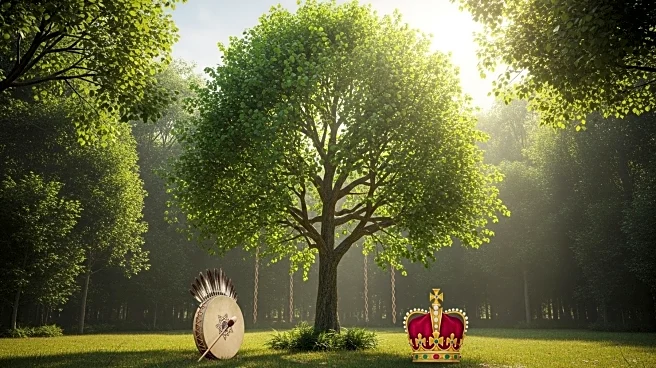What is the story about?
What's Happening?
A unique gathering took place at Highgrove Gardens in Britain, where approximately 50 individuals, including King Charles and Indigenous elders from Mexico, Hawaii, the Amazon, and South Africa, participated in a fire ceremony. The event was sponsored by Grounded, an environmental group, and aimed to explore new directions in climate action. Participants, dressed in formal attire, engaged in spiritual practices led by a shaman, emphasizing the sacredness of nature. The ceremony highlighted the urgent need to transform humanity's relationship with the planet amidst the accelerating impacts of global warming, such as wildfires and biodiversity loss.
Why It's Important?
The ceremony underscores the growing recognition of spirituality in environmental activism, suggesting that valuing nature as sacred could be pivotal in addressing climate change. As global warming intensifies, events like these aim to foster a deeper connection with the environment, potentially influencing public policy and societal attitudes towards conservation. The involvement of high-profile figures like King Charles and diverse cultural representatives highlights the global and inclusive nature of the climate crisis, emphasizing the need for collaborative efforts across different sectors and communities.
What's Next?
The event at Highgrove Gardens may inspire similar gatherings that blend spirituality with environmental activism, potentially influencing broader climate action strategies. Stakeholders, including political leaders and environmental groups, might consider integrating spiritual elements into their campaigns to enhance public engagement and support. As the impacts of climate change become more severe, such initiatives could play a crucial role in mobilizing communities and driving policy changes aimed at sustainable development and conservation.
Beyond the Headlines
The integration of spirituality into climate activism raises ethical and cultural questions about the role of traditional practices in modern environmental movements. It challenges conventional approaches to conservation, suggesting that a holistic view of nature could lead to more effective and inclusive strategies. This shift may also prompt discussions on the legal recognition of Indigenous knowledge and practices in environmental policy, potentially leading to long-term changes in how societies interact with and protect the natural world.
















